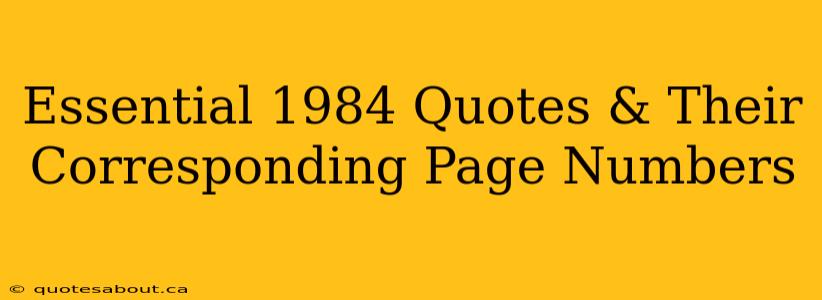George Orwell's Nineteen Eighty-Four remains a chillingly relevant exploration of totalitarianism, surveillance, and the manipulation of truth. Its enduring power stems not only from its dystopian vision but also from its potent and memorable quotes. This article delves into some of the most essential quotes from the novel, providing their page numbers (based on the Signet Classic edition) and exploring their significance within the context of the story and our contemporary world. Note that page numbers may vary slightly depending on the edition.
Disclaimer: Page numbers provided are approximate and may differ based on the specific edition of Nineteen Eighty-Four you are reading. Always refer to your own copy for precise location.
Key Quotes and Their Deeper Meanings:
"War is Peace. Freedom is Slavery. Ignorance is Strength." (Page 17)
This is arguably the most famous quote from Nineteen Eighty-Four, encapsulating the Party's paradoxical and manipulative slogans. It highlights the Party's ability to twist language and reality to control the minds of its citizens. "War is Peace" refers to the perpetual state of war that Oceania is in, which paradoxically creates stability and control. "Freedom is Slavery" illustrates the Party's argument that individual freedom leads to chaos, requiring oppressive control for order. "Ignorance is Strength" points to the Party's suppression of knowledge and critical thinking, believing that an uninformed populace is easier to control. This quote serves as a chilling reminder of how easily language can be manipulated to serve oppressive ideologies.
"Who controls the past controls the future. Who controls the present controls the past." (Page 36)
This quote reveals the Party's meticulous control over history. By rewriting the past, the Party creates a narrative that supports its present actions and justifies its future plans. This constant rewriting of history, through the Ministry of Truth, ensures absolute control over the populace's understanding of reality and their ability to challenge the Party's authority. The quote demonstrates a cyclical process of power; control of the present dictates the past, which in turn influences the future.
"Doublethink means the power of holding two contradictory beliefs in one's mind simultaneously, and accepting both of them." (Page 39)
Doublethink is a crucial concept in Nineteen Eighty-Four, highlighting the psychological manipulation imposed by the Party. It demonstrates how the Party compels its citizens to accept contradictory statements as simultaneously true, eradicating independent thought and critical analysis. This mental gymnastics is not only crucial for the Party's power but reflects a larger societal concern about the acceptance of misinformation and contradictory narratives.
"Big Brother is watching you." (Page 3)
This omnipresent threat underscores the constant surveillance that permeates Oceania. The image of Big Brother, while possibly fictional, instills fear and discourages dissent. The ubiquitous posters are a powerful symbol of the Party's absolute control, creating a pervasive sense of being watched and monitored in every aspect of life. This constant threat impacts behavior and restricts personal freedoms.
Frequently Asked Questions (FAQs):
What is the significance of the telescreen in Nineteen Eighty-Four?
The telescreen, a ubiquitous device capable of both broadcasting and surveillance, is a potent symbol of the Party's complete control over its citizens. It represents constant monitoring and the erosion of privacy, forcing individuals to self-censor and conform to Party ideals. Its presence highlights the chilling reality of pervasive surveillance and its impact on individual freedom.
How does Newspeak function in the novel?
Newspeak, the Party's simplified language, is designed to limit thought and expression. By reducing vocabulary, the Party aims to eliminate the possibility of expressing rebellious or counter-revolutionary ideas. Its deliberate impoverishment of language effectively suppresses thought and reinforces Party ideology.
What is the role of the Thought Police in Nineteen Eighty-Four?
The Thought Police represent the Party's pervasive and terrifying system of surveillance and repression. They monitor citizens' thoughts and actions, targeting any deviation from Party orthodoxy. Their presence serves as a constant reminder of the Party's absolute power and the consequences of dissent.
What is the significance of Winston's relationship with Julia?
Winston's forbidden love affair with Julia represents a powerful act of rebellion against the Party's oppressive regime. Their relationship symbolizes the human yearning for intimacy, connection, and freedom of thought in the face of totalitarian control.
This analysis explores just a fraction of the compelling quotes found within Nineteen Eighty-Four. Each quote provides a window into Orwell’s powerful critique of totalitarianism, demonstrating the novel's continuing relevance and importance to contemporary readers. Further exploration of the text reveals even more profound insights into Orwell's chillingly prophetic vision.

